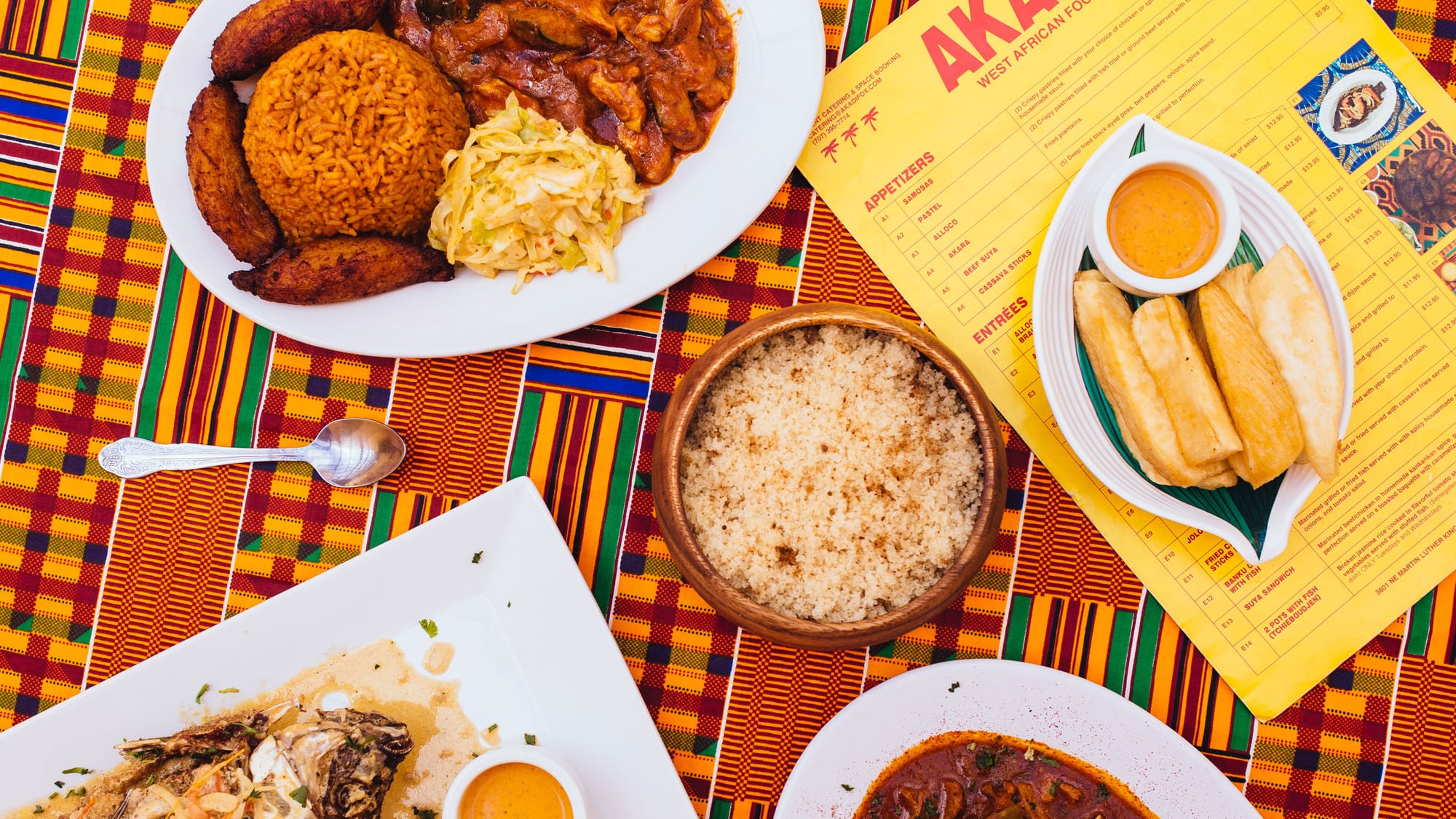As a teenager in rural Maine, I was starved for any taste of the broader world. The one time this happened was in August, when migrant workers from all over North America flooded the area to harvest blueberries. Working in the fields beside Mexicans, Native Americans from Nova Scotia, and people chasing alternative lifestyles from wherever, I learned how to peel a mango, discovered black metal and calculated the end of humanity with some dude whose car was wallpapered with Bruce Lee stickers.
Besides the relief from small-town boredom, the annual migration eventually brought a Mexican restaurant serving traditional plates whose flavors I never could have imagined. When food offers nourishment, it fulfills a corporal need. But when it becomes a portal into a new world, it's as mind-expanding as travel, without the cost of airfare.
With its hints of French influence, West African food is not unprecedented in Portland, but still rare. Black Star Grill food cart, for instance, has served flavorful West African bowls since 2017. Its tantalizing flavors left me hungry for a wider range of dishes from the region—which led me to Akadi.

Akadi serves plates from countries throughout West Africa, with a focus on the Ivory Coast and Burkina Faso. Chef-owner Fatou Ouattara, who moved from the Ivory Coast to attend Portland State University at age 23, rules the kitchen, churning out around 40 vegetarian, seafood and meat items on the menu. Her cooking is transportive, thanks to a deft ability to build flavor, using smoked vegetable mixes in place of spices as the foundation of many of her dishes.
Akadi is a humble space with a warm orange, red and green color scheme, decorated with African kente tablecloths and a large mural of a sunset over an African plain. At times, it buzzes with people wearing vividly dyed boubou robes and V-neck dashiki.
The dishes at Akadi took me to places I've never been before. Cassava sticks—made from the yuca-like cassava tuber—were as crowd-pleasing as french fries, particularly when combined with the otherworldly tomato-based dipping sauce. It was tangy and creamy, with a subtle, throbbing heat, plus something familiar—kaffir lime? Lemongrass? The waiter would say only "spices."

Several appetizers were unavailable during my visits, so the entrees are more reliable. The national dish of the Ivory Coast, attieke poisson braise, took my palate into foreign territory—its sweet-tart sauce with a hint of mustard made my eyes roll into the back of my head. You can also get the dish with chicken or grilled fish, but the deep-fried whole tilapia was my favorite. It arrived wonderfully crispy, its light flavor and moist flesh marrying with the super-sweet stewed tomato and onions and reduced sauce. The accompanying attieke, a dish of steamed grated cassava, was like a cross of couscous and quinoa—you can get it in place of rice with any dish.
Offering another smooth introduction to West African food, Akadi's Jolof Meal will be familiar to anyone who has eaten at Black Star Grill. It offers your choice of protein over a gumbolike tomato-infused rice with fried plantains.

If you're feeling more adventurous, West Africa's slow-simmered stews get their own section of the menu. Each comes with your choice of white rice or fufu, a starchy ball of steamed dough, which I hesitatingly describe as a big ball of mashed potatoes. I'd eaten something like fufu while researching an article in South Africa, so I knew I should pinch a tiny bit from the ball to eat with each bite of the dish—it's also an excellent way to scoop up sauce.
Ouattara makes her fufu over the course of several days. She uses a mother to launch fermentation and a mortar-and-pestel-like technique involving a daga clay pot. The result is an especially smooth consistency.

Two of the stews I had were underwhelming. A vegetarian take on mafe, aka peanut butter stew, was short on vegetables. My okra stew with barley and shrimp was also lacking—in this case, in regards to seasoning.
"The Goat" came to my rescue. Revealing the long-developed flavors I'd been looking for, the molten, highly concentrated and simply named tomato-based stew had the spicy-fruity complexity of myriad dried chilies, plus tender goat meat. Fufu was the perfect accompaniment, a gripping palate cleanser that could strip the heat.

There's a lot more to try at Akadi. Most dishes run $12 to $15. If you're pinching pennies, a party of two can probably eke by with an appetizer and one entree.
And note the drink menu is an anomaly in Portland: No craft beer, only Heineken, Coors and the like, but Akadi serves $5 shots of premium liquors, like Hennessy and Patron. For something more interesting, try the South African wines by the glass.
EAT: Akadi, 3601 NE Martin Luther King Jr. Blvd., 503-477-7138, akadipdx.com. Noon-10 pm daily.


